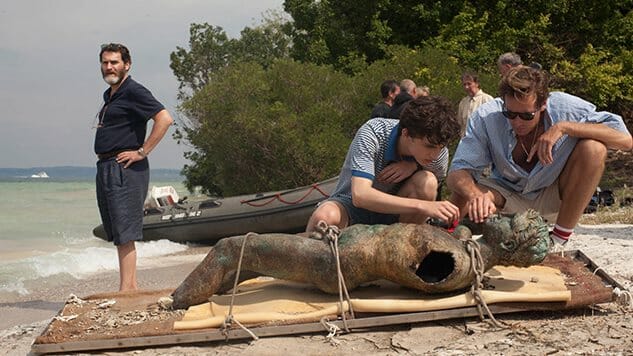Call Me By Your Name
(2017 New York Film Festival Review)
Images: New York Film Festival
The proclamation made from the opening frames of Luca Guadagnino’s new film Call Me By Your Name, an adaptation of the novel by Andre Aciman, is that the film is about surfaces. It may even love surfaces; external beauty is nothing if not a doorway to something more tender and elusive. Its title sequence, created by Chen Li, showcases scattered objects on a table filling the space left blank between photographs of statues and sculptures from antiquity. Though their faces are blank, in the detail of their eyes and of their expressions sliding gently against the smooth exterior of marble and other stones, there’s enough of a hint to suggest that, as Michael Stuhlbarg’s professorial patriarch Mr. Perlman suggests, the statues are “daring you to desire.” The film, while occasionally inching towards it, never takes that dare.
The bourgeoning romance (or is it fling?) between adolescent Elio (Timothée Chalamet) and graduate student Oliver (Armie Hammer) is, as depicted in Aciman’s novel, a cat and mouse game, a temptation and a lesson in how to cruise. The first half of Call Me By Your Name is about Elio training himself: how to recognize glances, how to look for meaning in a touch of the shoulder. Every intellectual gambit between Elio and Oliver is this little in-game, a performance in a secret language that’s not supposed to be very recognizable to anyone else. But Guadagnino seems ambivalent about letting his audience in on that game, watching Elio try to find that intimacy and desire in intimation—from a distance, literally. The film is composed travel-book-bee-yoo-tifully, consisting primarily of long shots, which means that rarely are we given the chance to get close enough to any surface to really unearth libidinous pleasures. Little of the film or its presence is tactile, save for select few moments, like the “peach scene,” where obvious care and focus goes into sound and image. Much of it lacks detail.
Call Me By Your Name’s fixation on statues and surfaces only ever pays off intermittently. Perlman, while showing Oliver slides of statues, says, “There’s not a straight body among them. They’re all curved.” We see, too, the statuesque beauty of Hammer from time to time, leaning in a doorway alone, sometimes sharing the frame with Elio, or perhaps placing his weight on one leg while looking at Elio sprawled on the bed. His sinewy musculature, contrasted against Chalamet’s lithe body, shimmers in the sunshine, and these moments—when Call Me By Your Name revels in their beauty and in the intoxication of their bodies lying contiguously—are to be cherished, because they feel so rare. Neither Elio nor the camera is ever willing to really cut up his body, to objectify him so that Oliver is merely physical parts disembodied without agency. Instead, the film’s is almost a coldly respectful gaze. It’s like being in a museum.
-

-

-

-

-

-

-

-

-

-

-

-

-

-

-

-

-

-

-

-

-

-

-

-

-

-

-

-

-

-

-

-

-

-

-

-

-

-

-

-








































